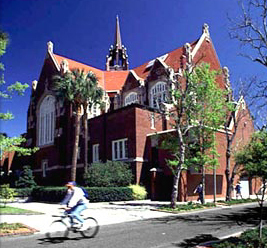Teaching
Methods in Latin
SYLLABUS
Fall 2002

University Auditorium, The University of Florida
|
Teaching
Methods in Latin |
|
|
|
|
|
University Auditorium, The University of Florida |
|
Course Description and Objectives Classroom "Netiquette" Required Textbooks Grading Absences and Late Work Honor Code ADA Requirements Dr. Hans-Friedrich Otto Mueller (h-fom), aka Molinarius, Department of Classics |
|
Course Description and Objectives This course will meet the needs of teachers in K-12 Latin education by developing an understanding of current theories of Latin language instruction, by observation and evaluation of teachers in the classroom, by critical assessment of current Latin textbooks, and by the development of curriculum, lesson plans, disciplinary policies, and appropriate evaluation instruments. Attention will also be paid to the successful integration of the at-risk and students with special needs. Our email discussions and our discussion boards represent our classroom space. In deciding whether or not something is appropriate, one has a rough and ready guide in this simple question: would what I contemplate saying be appropriate in the context of a traditional classroom? If so, then it is appropriate for our cyber classroom as well. If not, one must ask oneself why, and think very hard about proceeding. All classrooms work best in an atmosphere of mutual respect. Richard A. LaFleur, Latin for the 21st Century: From Concept to Classroom, Prentice Hall, 1998, ISBN 0673576086. N.B. Access to standard Latin textbooks will also be necessary for various lesson plan assignments. Ordering Information: The required book may be purchased from local bookstores or ordered from online bookstores such as www.barnesandnoble.com or www.amazon.com. To compare prices at many bookstores, try www.addall.com. The final grade will be based on discussion (40%), classroom assignments (40%), and a final project (20%). Discussion (40%) Each week (beginning with the third week), we will discuss a topic in Latin pedagogy via the discussion board in our WebCT site. If you participate, you will receive a grade of one hundred for that week. If you fail to participate, you will receive either a zero (if the absence is unexcused) or an "EX" (if the absence is excused; in other words, the week will count neither for you nor against you). Each week's discussion will be weighted equally. Classroom Assignments (40%) Various projects are assigned throughout the term, including, for example, weekly classroom evaluations, the construction of lesson plans, textbook reviews, and the like. Each of these assignments will receive a grade according to the one hundred point grading scale outlined at the end of this section. Each assignment will be weighted equally in this category. Final Project (20%) Your final project will be the creation of a Latin language resource website for your students, customized according to your interests and their needs. You may use either your own school's webspace or the space provided by the University of Florida with your GatorLink account, as you prefer. This assignment too will be graded according to the one hundred point scale outlined below. Grading Scale A: 90-100 ; B+: 87-89 ; B: 80-86 ; C+: 77-79 ; C: 70-76 ; D+: 67-69 ; D: 60-66 ; F: 0-59. Discussion Discussions constitute our classroom space. Just as one cannot go back in time and attend a class one has missed (no matter what the reason), so also discussions cannot be made up after the close of a given week's web board (each week's discussion board closes at midnight Sunday American Samoa Time -- which, in effect, gives procrastinators till early Monday morning Eastern Standard Time). Those who miss a week's discussion and who provide documentation of an absence excusable in accordance with university policy will be excused from a given week's discussion, and the missed week will count neither for nor against the final grade. Unexcused absences, however, will result in a zero for a given week's discussion grade. Classroom Assignments & Final Project All classroom assignments and projects (i.e., individual work submitted to the instructor for evaluation) missed for any reason may be made up. Work submitted late for reasons documentable as excused according to university policy may be made up with no penalty. Unexcused late work will be penalized at a one letter grade reduction (i.e. ten points on a scale of one hundred). Students are expected to uphold the Academic Honor Code. The Academic Honor System of the University of Florida is based on the premise that each student has the responsibility to:
A full statement of UF's Academic Honor Code may be found in the Undergraduate Catalog or at the following web site: http://www.dso.ufl.edu/STG/Code_of_Conduct.html#Honor Code. If you have any disability or special concern, please let me know what your needs are in order that they may be accommodated. According to the university, students with disabilities needing academic accommodations should also:
(This syllabus and other class materials are available in alternative format upon request.) For more information about services available to UF students with disabilities, contact the Office for Students with Disabilities: accommodate@dso.ufl.edu
Back to Top of Page Last
updated 8/27/02.
|